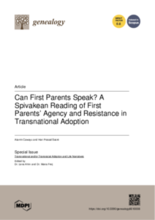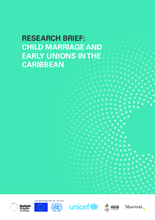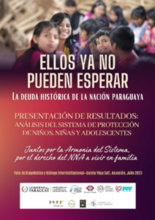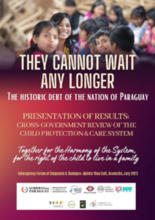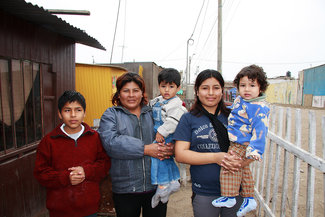

Displaying 21 - 30 of 346
This webinar was a panel conversation hosted by the CPC Learning Network, ChildFund Alliance, the Program on Forced Migration and Health at Columbia University, and the Watchlist on Children and Armed Conflict that brought together a panel of experts to discuss the root causes leading to recruitment and involvement in activities of armed groups as well as the current context in countries such as Sudan, Colombia, Syria, Iraq, Yemen, and more.
Four families torn apart by Chile’s illegal adoption scandal finally found each other decades later. They describe the emotional moment they met – and how they pieced together the lives they had spent apart
In this episode Amanda Griffith of Family for Every Child is joined by representatives of three member organisations who are working to support children's mental health and wellbeing across three continents.
The long-term consequences of COVID-19 have been tough for children around the world, but even more so for young children already in humanitarian crises, whether due to conflict, natural disasters, or economic and political upheaval. Drawing on research and voices from the Global South, this book showcases innovations to mobilize new funds and reallocate existing resources to protect children during the pandemic.
This article analyses the search strategies of first families in Bolivia contesting the separation of their children through transnational adoption. These first parents’ claims to visibility and acknowledgement have remained largely ignored by adoption policy and scholarship, historically privileging the perspectives of actors in adoptive countries, such as adoptive parents and adoption professionals.
This research brief summarizes what is already known about child marriage and early unions (CMEUs) in the Caribbean, complemented by the findings of research commissioned by UNICEF in the framework of the Spotlight Initiative Caribbean Regional Programme and conducted in six Caribbean countries: Antigua and Barbuda, Belize, Guyana, Haiti, Suriname and Trinidad and Tobago.
This webinar introduced new global inter-agency guidance on kinship care. During the webinar, panelists shared key lessons learnt on how to support kinship care, drawing particularly on examples of promising practices from South Africa, Zimbabwe, Liberia, and Brazil.
A pesar de que la Análisis Nacional y el plan de acción transversal fueron aprobados por la Corte Suprema de Justicia y el Consejo Nacional de la Niñez y la Adolescencia a principios de 2020, debido a la pandemia y la emergencia sanitaria nacional declarada en Paraguay, que afectó gravemente al sistema de protección, nuestro gobierno no pudo implementar el plan interinstitucional basado en evidencia para optimizar nuestro sistema, que incluía medidas a corto, mediano y largo plazo como solución a los problemas identificados.
Even though the Cross-Government review and action plan were approved by the Supreme Court of Justice and the National Council for Children early 2020, due to the pandemic and national sanitary emergency declared in Paraguay (affecting the protect
Drawing from the learning from participatory research in Latin America and the Caribbean as well as Australia, this webinar will introduce different approaches used to engage individuals with lived experience of alternative care in research efforts and highlight some of the key findings and lessons for meaningful and effective engagement.

